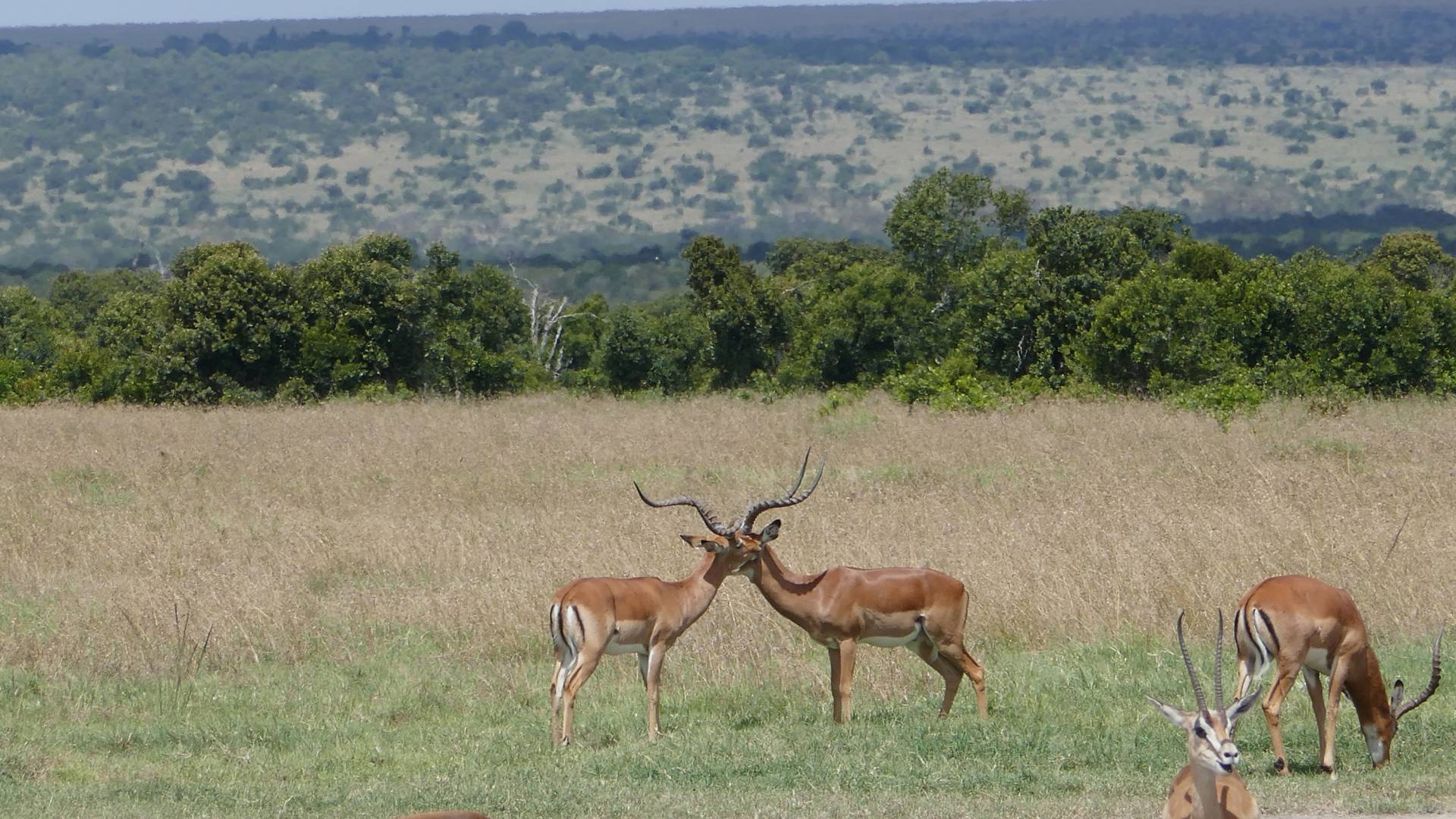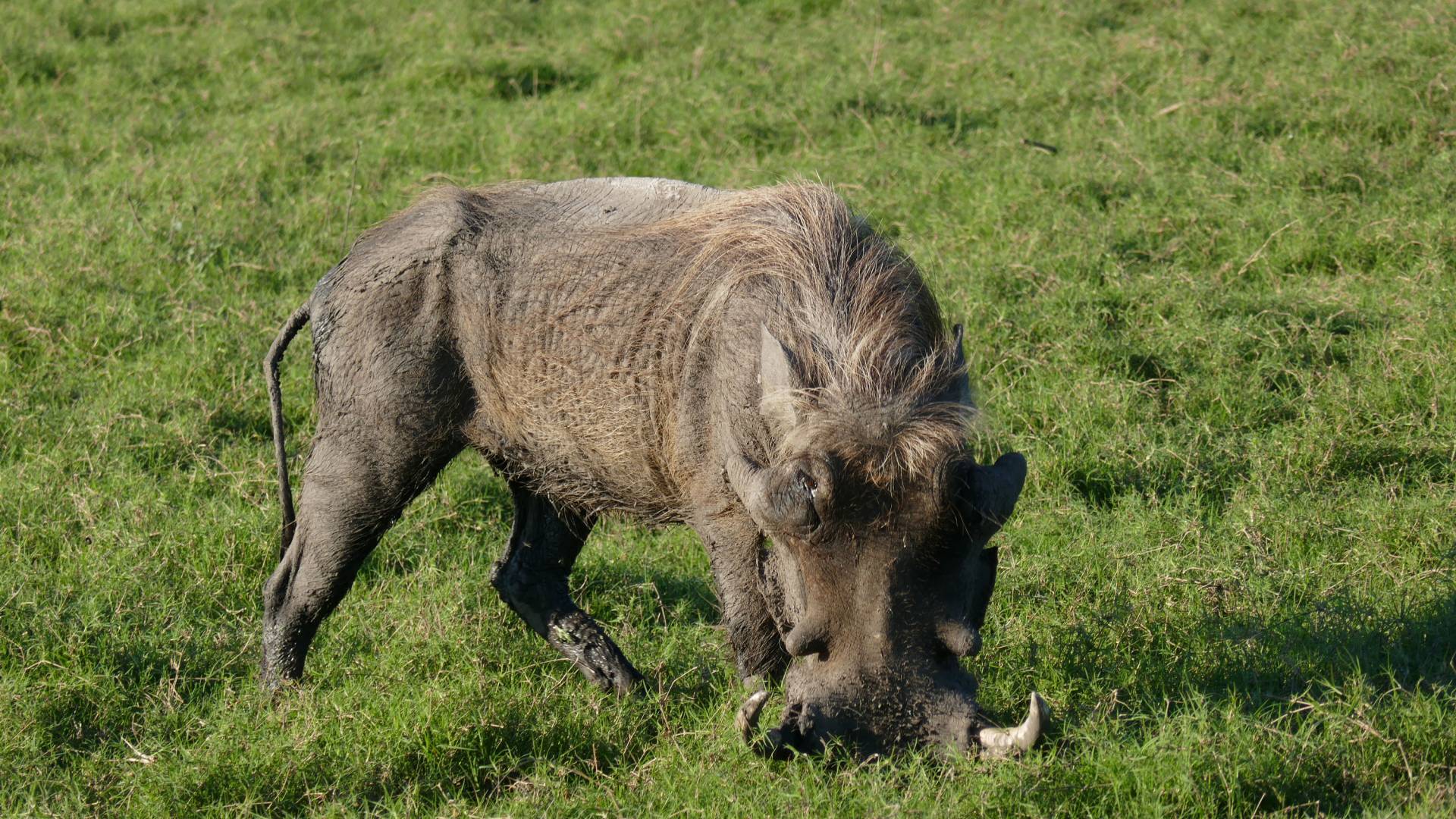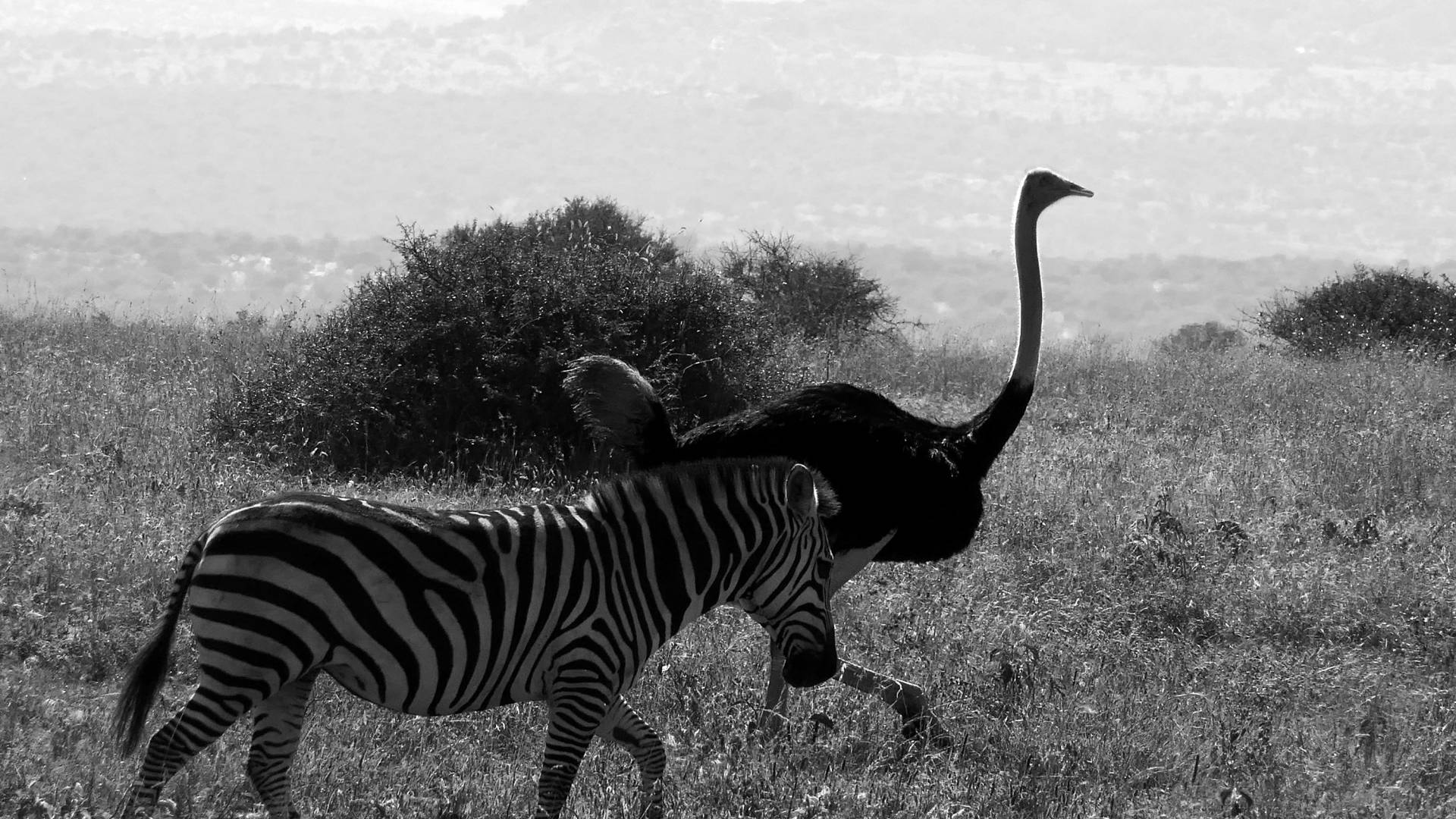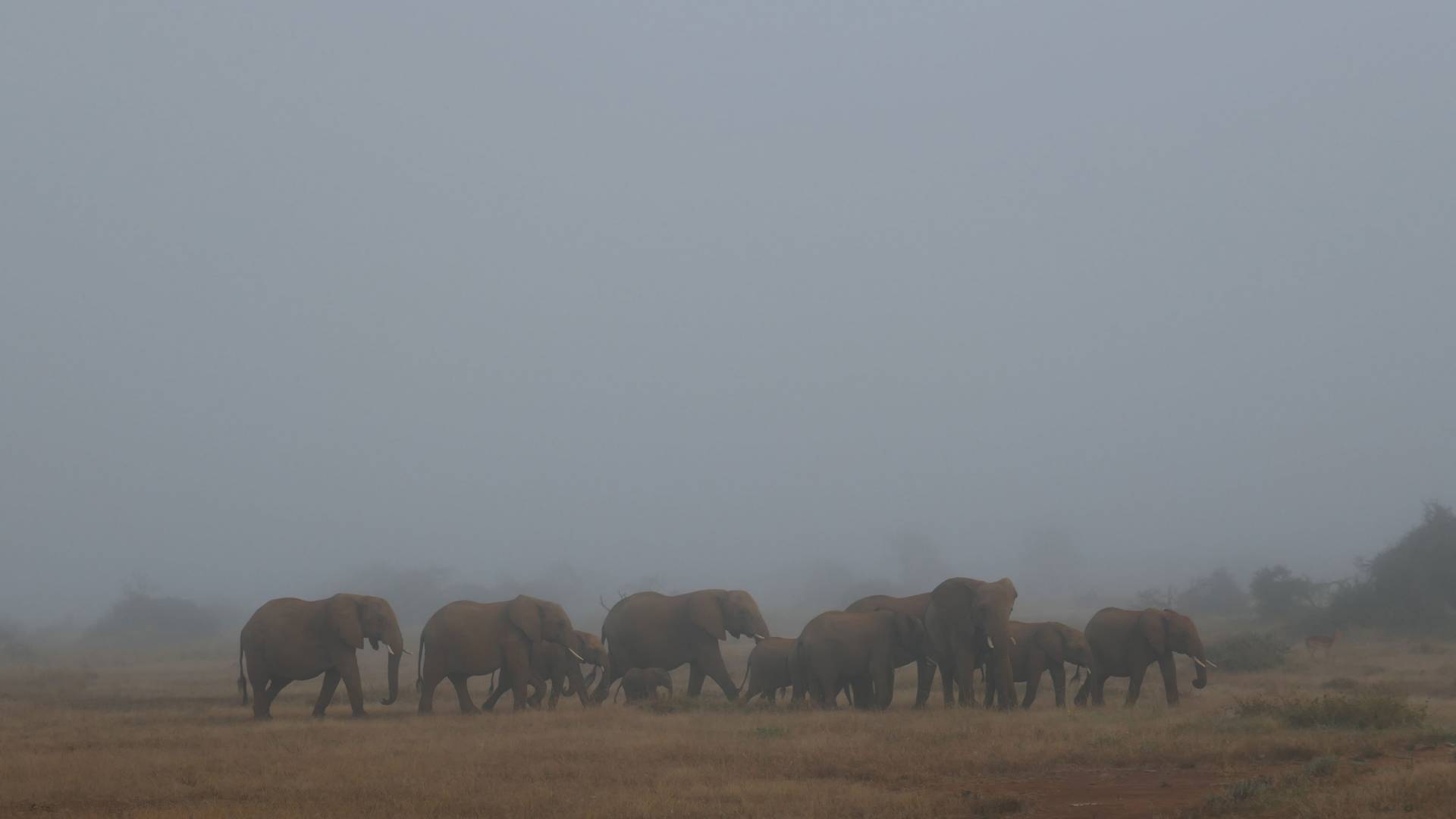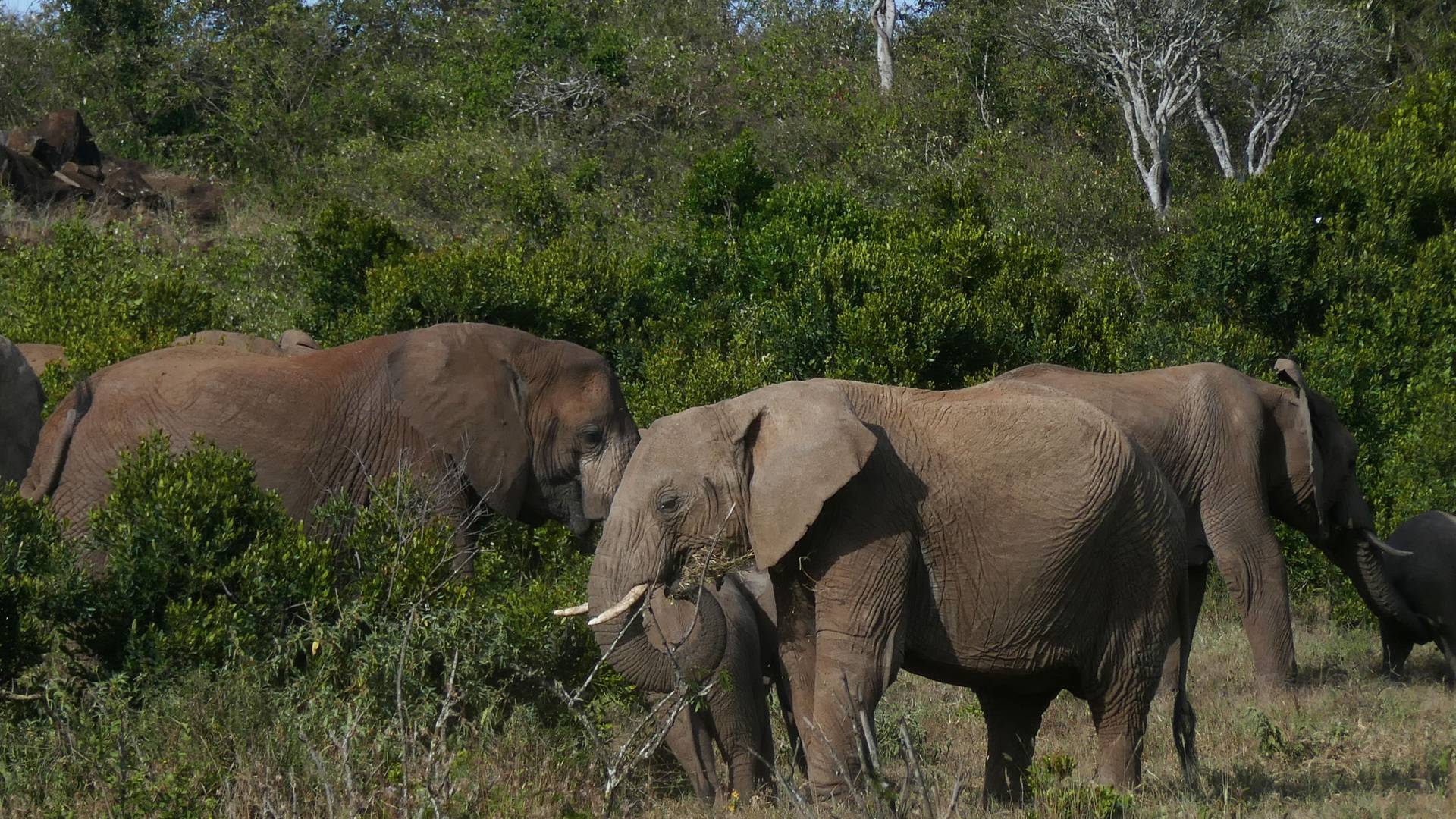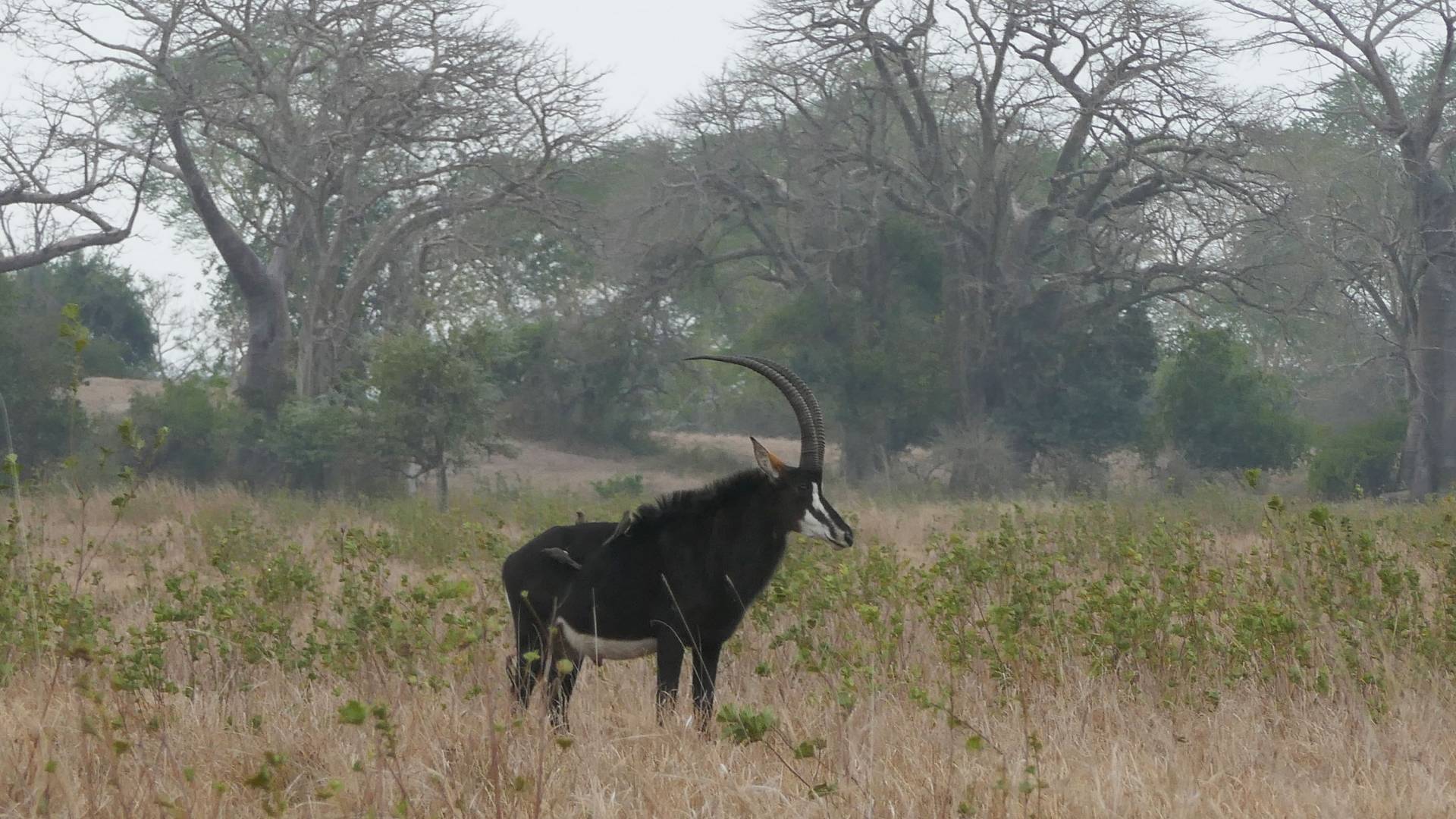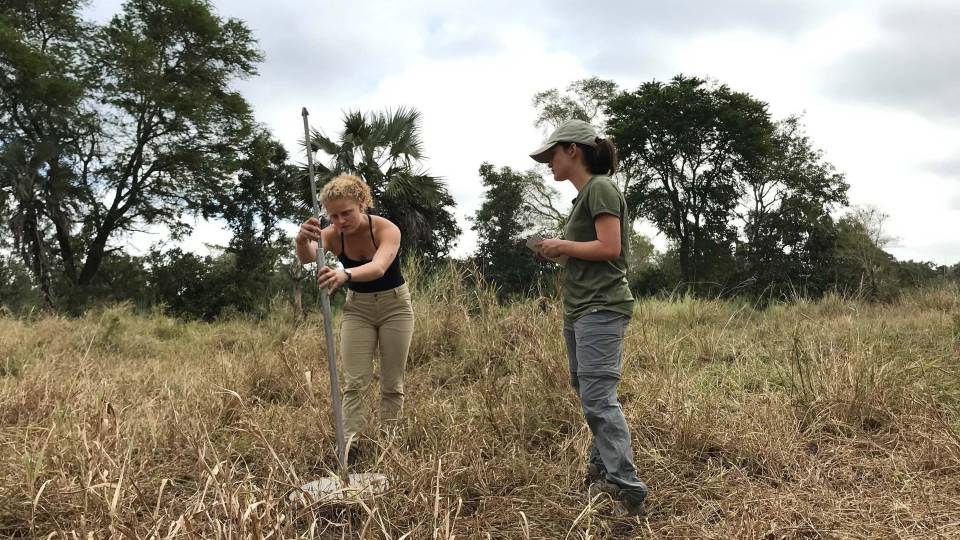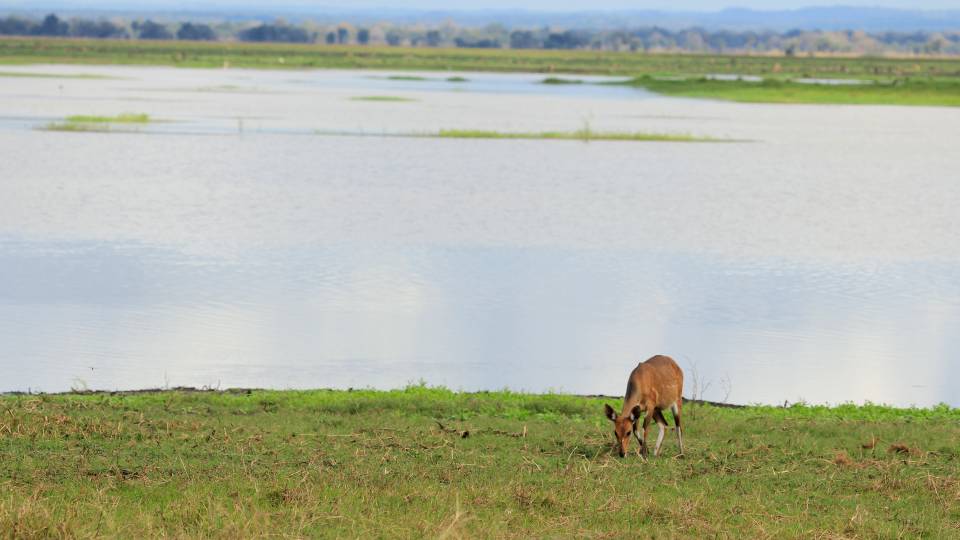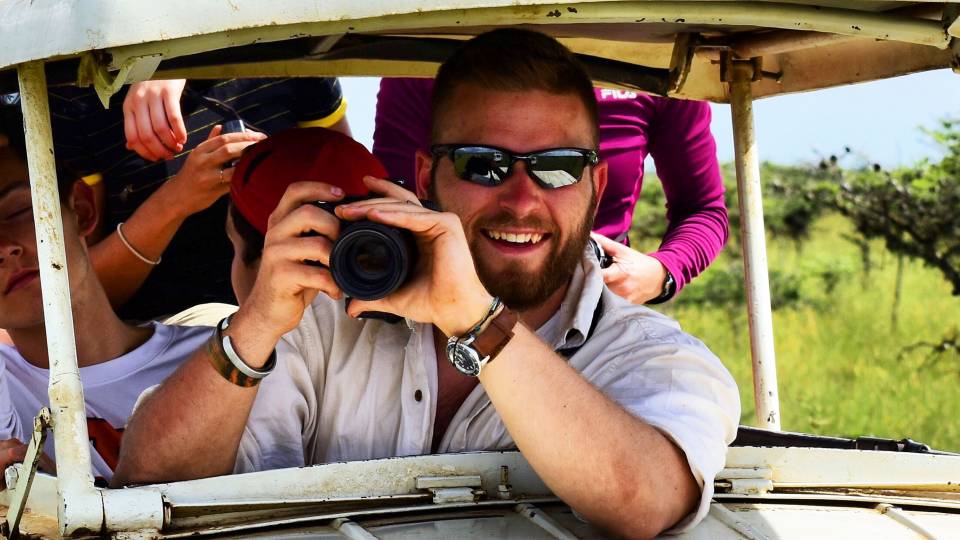For his senior thesis, Luca Kuziel is investigating the biomes and microbiomes of animals in six African regions, including Gorongosa National Park in Mozambique, where he spent two pre-COVID-19 field seasons, and the Mpala Research Center in Kenya (seen here).
When Luca Kuziel discovered the community of ecologists at Princeton, he had no idea that his experience of radical acceptance with them would change the course of his research and his life.
Over the past four years, he has deepened his love of the natural world and gone through his own metamorphosis, coming out as transgender during his second summer at Gorongosa National Park in Mozambique. But when he tried to go back for a third summer, to gather data for his senior thesis, he was stymied by COVID-19 travel restrictions.

Kuziel has been interested in Gorongosa ecology since his first year at Princeton, when he applied to work with ecologist Rob Pringle (right) and members of Pringle’s lab to study the ecology of an ecosystem recovering from the damage inflicted during a devastating civil war.
“Luca has been dealt a series of blows to plans that he really cherished, and despite that, he’s never gotten discouraged,” said Robert Pringle, Kuziel’s adviser and an associate professor of ecology and evolutionary biology (EEB). “I told him recently, ‘I wish everyone were handling this — all of this — as well as you are.’ It’s really inspiring to see such a young person staying rock steady, making the best of the situation, maintaining good spirits throughout the constantly evolving circumstances.”
He added: “Luca tried valiantly, but he wasn’t given permission to be on campus this fall.” Due to strict limitations related to COVID-19, very few undergraduates were allowed to study on campus. “He ended up working [virtually] in collaboration with two former undergrads who are now lab managers in my lab. It was neat to see this self-organizing group figuring things out together.”
Connections between and among EEB students and faculty are forged in classrooms, on field trips, in labs and on research trips all around the world.
In Kuziel’s first course with the department, he recalled, he went on hikes and raced spiders — to assess whether their legs were better suited to movement on a web or on the ground.
That blend of whimsy and world-class research just unlocked something inside him, he said.
“My whole life, I’ve known that I love nature,” said Kuziel, a Princeton senior majoring in EEB and pursuing a certificate in environmental studies. “That’s been a constant. But being with people who share that passion — a passion that transcends boundaries — I’ve always felt like, ‘In EEB, these are my people, this is my tribe.’”
Step one of a thesis journey four years in the making: Investigating Gorongosa ecology
During his first year at Princeton, Kuziel applied for a research internship from the High Meadows Environmental Institute (HMEI) that funded a summer working at Gorongosa with Matthew Hutchinson, a graduate student in Pringle’s lab group.
African field research might conjure up images of jeep rides to count safari animals — and Kuziel did get a chance to do that — but Pringle and his team are also investigating the microbiomes inside the park’s animals, which requires studying their feces. “Fecal samples are so central to what we do,” said Pringle. “Poop is a window into the lives of animals. Glamorous, right?”

During his second field season at Gorongosa, in the summer of 2019, Kuziel (right) examined elephant feces with Pringle’s graduate student Matthew Hutchinson (left) and Zoe Rennie, a fellow High Meadows Environmental Institute-funded intern from the class of 2021.
Glamorous or not, Kuziel was hooked.
As soon as he got back to Princeton after his first field summer in Gorongosa, he applied to return for a second field summer and he enrolled in Pringle’s course, “Ecology: Species Interactions, Biodiversity and Society.” For a project in that class, Kuziel wanted to test whether Princeton’s native fauna (deer) have an innate fear of their last major predator (cougars, which have probably been extinct in the region for more than a century) or whether fear is a learned response.
So he played audio recordings of cougar roars in the woods surrounding campus and watched how deer responded. “It’s definitely learned,” he said. “I played the sounds and a baby deer walked up to me. It was a very Disney moment.”
That project has specific implications for Gorongosa, where the ecosystem was decimated by 15 years of civil war but has been steadily recovering since the early 1990s. After giving the prey animals more than 20 years to establish healthy populations, the ecologists managing the park have slowly reintroduced predators: first packs of wild dogs and recently several leopards.
During his summers in Gorongosa, Kuziel had hoped to study the leopard re-introduction, but that was delayed, so he studied other aspects of the park’s ecology instead, including the effects of the reintroduced wild dogs on the behavior of their prey. His work contributed so much to an upcoming research article about antelope behavior in the journal Ecological Monographs that he is named as a co-author.
Kuziel still marvels that he had the opportunity to go to Africa three times in three years — twice for HMEI internship summers in Gorongosa, plus he went to Mpala Research Centre in Kenya for the spring semester of his junior year.
“This is why you try to get into a school like Princeton, for these extraordinary opportunities,” he said. “It’s been a very defining part of my Princeton journey.”
Forging a unique community
His summers at Gorongosa were marked by long days of exhausting field work, followed by long evenings of laughing together, often at poop jokes, Kuziel said. The resulting bonds were like nothing he had experienced before.
“I was immersed in nature with people who I really liked and who felt the same way I do about nature,” Kuziel said. “I think that definitely let me relax and be more myself.”
That sense of freedom and unconditional acceptance encouraged him to take the next step toward claiming his identity, Kuziel said. By his second summer in Gorongosa, he had cut off the long braid that he had sported his first summer, and he started asking people to call him Kuziel instead of using his given name. That fall, he started going by Luca and asking people to use he/him or they/them pronouns when referring to him. “It evolved quickly from there,” he said. By the time he went to Mpala in the following spring, he was using only male pronouns.
“Part of what was so exciting about my time in Kenya was that only one person there had known me before transitioning, and we’re close friends, so it was really my first time being only Luca, using he/him,” he said.
He had been afraid that in coming out as trans, he would burn bridges — that not only would he face personal rejection but that he would lose the chance for future research in the ecosystem he loved.
“But Rob and Matt and everyone — they’ve all been amazing,” he said. “I felt like I hadn’t lost an opportunity, that maybe I could come back here for my thesis.”
But then came COVID-19.
Proposing — and proposing — thesis ideas
For his senior thesis, Kuziel planned a project similar to his deer and cougar experiment, again using a simulated predator to assess the prey reactions, this time by introducing inflatable crocodiles into the ponds that form around Gorongosa’s central lake when it floods.
“Putting crocodiles in waterholes to see if that frightened the animals away from the drinking water was such a creative, original experimental idea,” said Pringle.
But the pandemic ended University travel, so Kuziel couldn’t go to Mozambique, with or without inflatable crocodiles. Kuziel was actually at the Mpala, as part of his EEB semester abroad, when the pandemic brought an abrupt end to all international study.
Back home in New Mexico, he proposed a series of alternate thesis ideas that he could do at Princeton. When he learned that his application to come back to campus in fall 2020 had been declined, he had to pivot again.
“Luca’s plans were getting bashed by circumstances left and right,” said Pringle. “But he was amazingly resilient and adaptable. He just kept adjusting, figuring out new plans and new ways to make it exciting.”
Virtual silver lining: A senior thesis using data from six national parks across Africa
Kuziel and Pringle settled on a thesis that turned the challenges of COVID-19 into an advantage: Since he couldn’t gather his own data at one national park, he would use previously gathered samples from six animal species — baboons, warthogs, kudu, hartebeest, impala and zebra — at six national parks — Gorongosa in Mozambique, Mpala in Kenya, Kafue National Park in Zambia, Serengeti National Park in Tanzania, Niassa National Reserve in Mozambique and Nyika National Park in Malawi — to investigate the fungi found in the animals’ intestines.
Over the years, Pringle and his research team have gathered many more fecal samples than they’ve had the time to fully analyze, so Kuziel had a rich trove to choose from.
By using such different animals, Kuziel was able to analyze the fungi across digestive systems and “feeding guilds,” groups of animals that eat the same species.
Most microbiome work has focused on bacteria, which make up the vast majority of animals’ intestinal flora. But recent research has shown that fungi in the gut may be important for digestion and immune function, and Kuziel wanted to see if the animals eat mushrooms or other fungi — a basic question with surprisingly little available data. By sequencing fungal DNA in fecal samples, he could identify fungi that are eaten as well as those that naturally reside in the animals’ intestines.
A literature review revealed that Kuziel is the first researcher ever to look at geographic variation in the fungal microbiomes of large plant-eating mammals.
Kuziel hopes that his work might provide insights useful for reforestation efforts. Plants have symbiotic relationships with different fungal species, using tiny structures called mycorrhizae that let them share nutrients and perhaps even communicate. Kuziel’s hypothesis is that since trees need mushrooms and other fungus species to thrive, herbivores might help speed the restoration of damaged ecosystems by distributing fungi.
“Similarly to the way some seeds need to be eaten by birds in order to germinate, some fungal spores can only be spread through herbivore poop,” he explained. “Feeding a porcupine the right species of mushrooms, then releasing her into an area that needs reforestation or needs more plant growth, could let her spread helpful spores.”
While Kuziel studied remotely in fall 2020, Megan Demmel and Ciara Nutter in Pringle’s lab prepped and sent his samples out for genetic analysis.
“The idea he settled on, looking at the fungal component of microbiomes, is really interesting,” said Pringle. “And his data are interesting, which has really validated that if you keep at it, collaboratively, creatively, interesting things will happen.”
The genetic analysis revealed that the fungi are more geographically dependent than species dependent. In other words, a warthog in Mozambique is more likely to share fungi with a baboon in the same park than with a fellow warthog in Kenya or Malawi. This is the opposite pattern to that found in bacteria.
Unfortunately, the pandemic also slowed the speed of the turnaround time from the genetic lab, so Kuziel had only a few weeks to analyze his data before his thesis was due.
“I’m really excited to see these new, fresh, exciting patterns in the data, even though he would have benefited from more time to fully explore it,” said Pringle. “Hopefully that’s something he’s interested in pursuing even after his thesis is turned in. The thesis is a stop on the road, but the creation of the knowledge and making it available to other people — potentially in the form of a publication — is the ultimate goal.”
Pringle said he would be open to Kuziel continuing his work as a researcher in his lab or as a member of one of his field research teams.
Kuziel still feels the pull of field work. “I would love to go back to Gorongosa, or to go to Mpala and continue this research,” he said. “Everyone says, ‘College is the time to reinvent yourself.’ I felt like Gorongosa was an even more pronounced version of that, with a really special group of people.”


